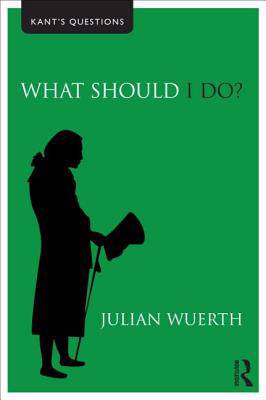
- Retrait gratuit dans votre magasin Club
- 7.000.000 titres dans notre catalogue
- Payer en toute sécurité
- Toujours un magasin près de chez vous
- Retrait gratuit dans votre magasin Club
- 7.000.0000 titres dans notre catalogue
- Payer en toute sécurité
- Toujours un magasin près de chez vous
Description
Of all his contributions to philosophy it is perhaps Kant's writings on ethics that are the most widely read. Kant himself posed the famous question: What should I do? In this engaging and lucid book Julian Wuerth explores the question that frames Kant's moral philosophy and places it in a contemporary context, offering a stimulating and direct path into Kant's moral thought.
He opens with a helpful introduction to the main traditions in ethics prior to Kant before outlining Kant's theory of human nature - particularly his division of the soul into the faculties of cognition, feeling and desire - which is essential for understanding his moral theory.
He then introduces Kant's arguments in his famous Groundwork of the Metaphysics of Morals, above all for his famous 'categorical imperative', explaining the roles of humanity, self-consciousness and freedom in Kant's moral philosophy, and Kant's identification of moral action with autonomy.
The second part of the book considers criticisms of Kant's moral philosophy, including those of Sidgwick and Hegel and asks whether Kant's categorical imperative can provide moral guidance, before turning to the dominant, constructivist interpretations of Kant's ethics today, as defended by leading philosophers such as O'Neill and Korsgaard. Julian Wuerth argues that constructivist interpretations overlook central features of Kant's account of moral agency and so conflate the demands of virtue and happiness - in effect ascribing to Kant a view that he repeatedly targeted in previous ethical traditions.
The final part of the book considers Kant's moral philosophy from a contemporary perspective. Despite important differences between them, Kant's ethics is shown to resemble virtue ethics in addressing our development as persons, advocating a lifelong process of the cultivation of both our sensible and intellectual cognitive and emotional capacities.
Spécifications
Parties prenantes
- Auteur(s) :
- Editeur:
Contenu
- Nombre de pages :
- 240
- Langue:
- Anglais
- Collection :
Caractéristiques
- EAN:
- 9780415492577
- Date de parution :
- 03-12-23
- Format:
- Livre broché
- Format numérique:
- Trade paperback (VS)
- Dimensions :
- 159 mm x 235 mm

Les avis
Nous publions uniquement les avis qui respectent les conditions requises. Consultez nos conditions pour les avis.






